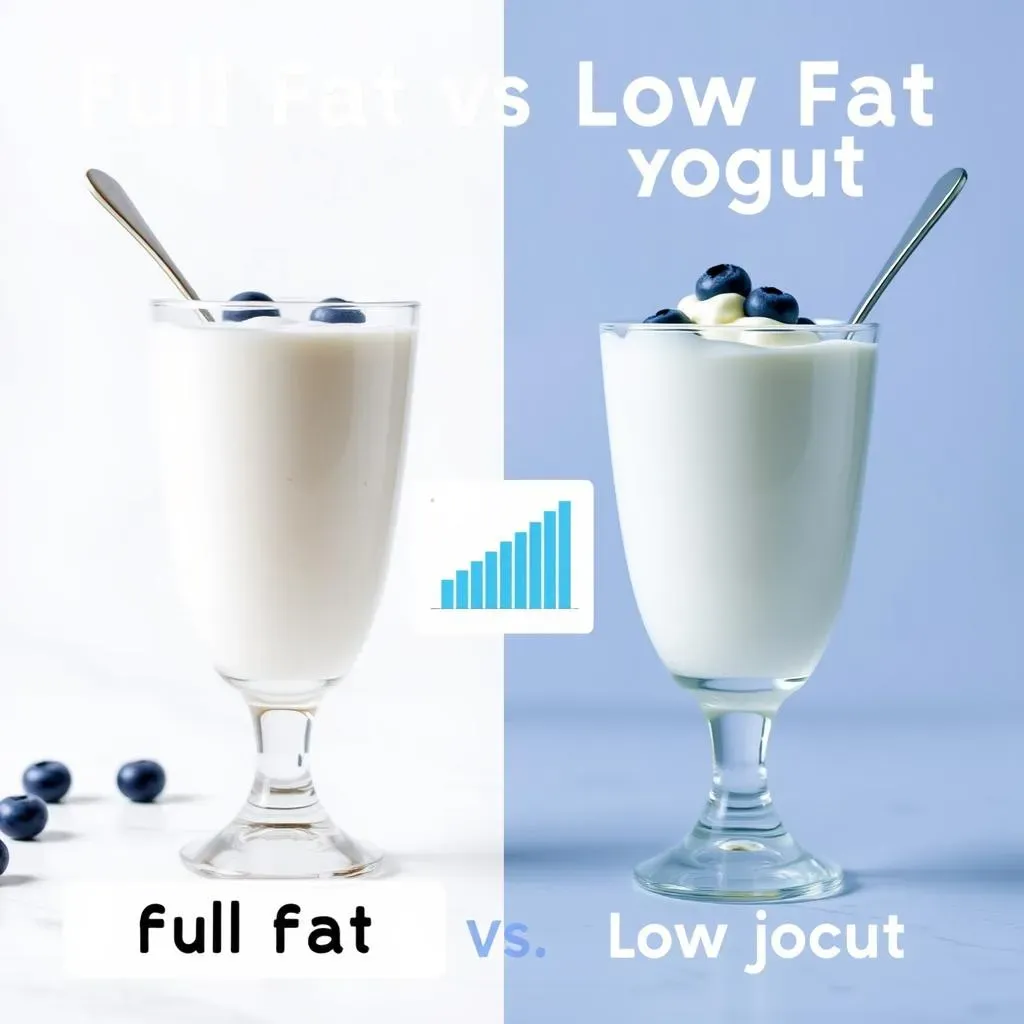Table of Contents
Yogurt, a staple in many diets, often gets caught in the crosshairs of health debates. Especially when it comes to cholesterol. If you're watching your cholesterol levels, you've probably wondered: does low fat yogurt have cholesterol? It's a valid question, considering the mixed messages we often hear about dairy and its impact on heart health. This article cuts through the confusion, offering a clear, fact-based exploration of yogurt and cholesterol. We'll dive into the different types of yogurt, examining the cholesterol content of low-fat versus full-fat varieties. Beyond just the numbers, we'll explore the broader health benefits of low-fat yogurt, from its probiotic power to its role in a balanced diet. Forget the conflicting headlines and diet fads, we're here to provide you with the knowledge you need to make informed choices about incorporating yogurt into your healthy lifestyle. By the end, you'll have a solid understanding of how yogurt, specifically low-fat options, fits into a cholesterol-conscious diet.
Understanding Cholesterol Basics and Its Role in Your Body

Understanding Cholesterol Basics and Its Role in Your Body
so let's break down cholesterol. It's not the villain it's often made out to be. Cholesterol is a waxy substance that's actually essential for building cells and producing hormones. Your body makes cholesterol, and you also get it from the foods you eat. The problem arises when you have too much of the "bad" kind, known as LDL cholesterol.
Think of LDL cholesterol as a delivery truck that drops off cholesterol to your arteries. When there's too much LDL, it can build up on the artery walls, forming plaque. This plaque can narrow the arteries, making it harder for blood to flow through, leading to heart disease and stroke. On the flip side, HDL cholesterol is the "good" kind. It acts like a garbage truck, picking up excess cholesterol from your arteries and taking it back to the liver for disposal.
So, what's the ideal scenario? You want to keep your LDL cholesterol levels low and your HDL cholesterol levels high. This balance helps maintain healthy arteries and reduces your risk of heart problems. Factors like diet, exercise, and genetics all play a role in influencing your cholesterol levels. Next, we'll get into the nitty-gritty of yogurt and cholesterol, specifically looking at low-fat options.
Does Low Fat Yogurt Have Cholesterol? Examining the Numbers

Does Low Fat Yogurt Have Cholesterol? Examining the Numbers
The Cholesterol Content in Low Fat Yogurt
So, does low fat yogurt have cholesterol? The short answer is yes, but the amount is generally quite small. Remember, cholesterol is naturally found in animal products, including milk, which is the base ingredient for yogurt. The key difference between full-fat and low-fat yogurt lies in the amount of fat removed during processing. When fat is removed to create low-fat yogurt, some cholesterol is also removed, but not all of it.
Typically, a one-cup (245 grams) serving of low-fat yogurt contains around 5-15 milligrams of cholesterol. To put that into perspective, the American Heart Association recommends limiting your dietary cholesterol intake to less than 300 milligrams per day for overall heart health. So, low-fat yogurt contributes a relatively small amount to your daily cholesterol limit.
However, keep in mind that the exact cholesterol content can vary slightly depending on the brand and specific type of low-fat yogurt. Always check the nutrition label for the most accurate information. Now, let's compare this to full-fat yogurt.
Low Fat Yogurt: Cholesterol vs Saturated Fat
While low-fat yogurt does contain some cholesterol, it's important to consider the bigger picture of saturated fat. Saturated fat is the type of fat that has a greater impact on raising LDL cholesterol levels compared to dietary cholesterol itself. Full-fat yogurt contains significantly more saturated fat than low-fat yogurt. This is why health professionals often recommend low-fat or non-fat dairy products as part of a heart-healthy diet.
Choosing low-fat yogurt allows you to enjoy the benefits of yogurt, such as its probiotic content and calcium, without the added saturated fat that can negatively affect your cholesterol levels. It's a strategic way to manage your cholesterol intake while still incorporating dairy into your diet.
Here's a quick comparison table:
Type of Yogurt | Cholesterol (per 1 cup) | Saturated Fat (per 1 cup) |
|---|---|---|
Low-Fat Yogurt | 5-15 mg | Varies, check label |
Full-Fat Yogurt | Higher than low-fat | Significantly higher than low-fat |
Decoding the Nutrition Label
Becoming a nutrition label detective is your best tool for navigating the world of yogurt and cholesterol. Pay close attention to the "Nutrition Facts" panel on the yogurt container. Look for the cholesterol content listed in milligrams (mg) per serving. Also, check the amount of saturated fat, trans fat, and total fat. Remember, the goal is to minimize saturated and trans fats while keeping total cholesterol intake within recommended limits.
Don't be fooled by clever marketing terms! Focus on the numbers on the nutrition label. Words like "natural" or "healthy" don't always guarantee a low-cholesterol, low-saturated-fat product. Always double-check the actual nutrient content to make the best choice for your health.
By understanding how to read nutrition labels and comparing different yogurt options, you can confidently choose low-fat yogurts that align with your cholesterol-lowering goals. Now, let's move on to exploring the impact of full-fat versus low-fat yogurt on cholesterol levels in more detail.
FullFat vs. LowFat Yogurt: Impact on Cholesterol Levels

FullFat vs. LowFat Yogurt: Impact on Cholesterol Levels
Alright, let's get down to brass tacks: full-fat versus low-fat yogurt and how they actually mess with your cholesterol. The big difference, as we've touched on, is the saturated fat content. Full-fat yogurt is rocking way more saturated fat than its low-fat counterpart. And saturated fat, my friends, is the real troublemaker when it comes to bumping up your LDL cholesterol, that "bad" cholesterol we're trying to keep in check. So, consistently pounding down full-fat yogurt could potentially nudge your LDL levels in the wrong direction. Low-fat yogurt, on the other hand, offers a way to enjoy the creamy goodness of yogurt without the same saturated fat baggage. It's like having your cake and (sort of) eating it too, at least when it comes to cholesterol management.
But it's not just about the saturated fat, it's about the overall dietary picture. If you're already eating a diet high in saturated fat from other sources like red meat, processed foods, and fried goodies, then adding full-fat yogurt to the mix could be overkill. However, if your diet is generally low in saturated fat, a small amount of full-fat yogurt might not make a huge difference. It's all about balance and making informed choices based on your individual needs and dietary habits.
Health Benefits of Low Fat Yogurt Beyond Cholesterol

Health Benefits of Low Fat Yogurt Beyond Cholesterol
Packed with Probiotics: Gut Health Superstar
so we've talked cholesterol, but low-fat yogurt is so much more than just a heart-healthy choice. It's a probiotic powerhouse! Probiotics are those beneficial bacteria that live in your gut and play a crucial role in digestion, immunity, and even mental health. Low-fat yogurt, especially varieties with "live and active cultures," can help replenish and diversify your gut microbiome. A healthy gut means better digestion, reduced bloating, and a stronger immune system to fight off those pesky colds.
Think of your gut as a garden. Probiotics are like the good gardeners, tending to the soil and keeping the weeds (bad bacteria) at bay. When your gut is thriving with good bacteria, it can better absorb nutrients from your food, regulate inflammation, and even produce important vitamins. So, by enjoying a daily dose of low-fat yogurt, you're not just managing your cholesterol; you're giving your gut a high-five!
Calcium and Vitamin D: Bone-Building Duo
Beyond the gut, low-fat yogurt is also a fantastic source of calcium and often fortified with vitamin D, a dynamic duo for strong bones and teeth. Calcium is the building block of your skeleton, and vitamin D helps your body absorb calcium effectively. Getting enough calcium and vitamin D is especially important as you age to prevent osteoporosis and maintain bone density.
Low-fat yogurt provides a convenient and delicious way to meet your daily calcium and vitamin D needs. It's a great option for people who don't consume a lot of dairy or have trouble absorbing calcium from other sources. Plus, it's a lot more exciting than popping a calcium supplement, right?
Protein Powerhouse: Keeps You Full and Energized
Last but not least, low-fat yogurt is a surprisingly good source of protein. Protein is essential for building and repairing tissues, supporting muscle growth, and keeping you feeling full and satisfied after a meal. Starting your day with a protein-rich breakfast, like low-fat yogurt with fruit and nuts, can help curb cravings and prevent overeating later on.
The protein in low-fat yogurt also helps stabilize blood sugar levels, preventing those energy crashes that can lead to unhealthy snacking. It's a win-win situation! You're getting a delicious, nutritious snack that supports your overall health and helps you stay on track with your healthy eating goals.
Choosing the Right Yogurt: Factors Beyond "Does Low Fat Yogurt Have Cholesterol?"

Choosing the Right Yogurt: Factors Beyond "Does Low Fat Yogurt Have Cholesterol?"
Added Sugar: The Sneaky Culprit
Alright, so you're on board with low-fat yogurt for cholesterol reasons, awesome! But hold up, because "low-fat" doesn't automatically equal "healthy." The yogurt aisle is a minefield of added sugars, and that's where things can get dicey. Many low-fat yogurts compensate for the lack of fat by loading up on sugar to improve the taste. And let me tell you, that added sugar can negate many of the health benefits we've been talking about. Excess sugar contributes to weight gain, inflammation, and can even negatively impact your cholesterol levels in the long run. So, before you grab that brightly colored, fruit-on-the-bottom yogurt, take a peek at the nutrition label and see how much sugar is lurking inside.
The goal is to choose yogurts with minimal added sugar. Look for plain, unsweetened varieties and add your own sweetness with fresh fruit, a drizzle of honey, or a sprinkle of cinnamon. This way, you're in control of the sugar content and can avoid those unnecessary sugar bombs. Remember, your taste buds will adjust over time, and you'll start to appreciate the natural tanginess of yogurt without the sugar overload.
Probiotic Power: Live and Active Cultures
We've already raved about the probiotic benefits of yogurt, but it's worth emphasizing the importance of choosing yogurts with "live and active cultures." Not all yogurts are created equal when it comes to probiotics. Some yogurts are heat-treated after fermentation, which kills off the beneficial bacteria. To ensure you're getting the probiotic boost, look for the "Live & Active Cultures" seal from the National Yogurt Association on the package. This seal indicates that the yogurt contains a significant amount of live and active cultures at the time of manufacture.
Different strains of probiotics offer different benefits, so experimenting with various yogurt brands and types can be a fun way to discover what works best for your gut. Some yogurts even list the specific strains of probiotics they contain on the label. Do some research and see which strains are known for supporting digestion, boosting immunity, or even improving mood. Your gut will thank you!
Here's a quick guide to probiotic buzzwords:
- Live & Active Cultures Seal: Guarantees a significant amount of live probiotics.
- CFU (Colony Forming Units): A measure of the number of live bacteria in a serving. Higher is generally better.
- Specific Strains: Look for strains like Lactobacillus and Bifidobacterium, which are well-researched and known for their health benefits.
The Ingredient List: Keep it Clean and Simple
Finally, take a look at the ingredient list beyond just the sugar content. The shorter and simpler the ingredient list, the better. Avoid yogurts with artificial flavors, colors, sweeteners, and preservatives. These additives don't add any nutritional value and can even be detrimental to your health. Stick to yogurts made with milk and live cultures as the primary ingredients. Anything else is just extra fluff that you don't need.
Think of it like this: you wouldn't want to eat a mystery concoction of chemicals, so why would you want to feed it to your gut? Choose yogurts that are as close to their natural state as possible. Your body will thank you for it. By being mindful of added sugar, probiotic content, and the ingredient list, you can confidently choose low-fat yogurts that are not only good for your cholesterol but also contribute to your overall health and well-being.
Conclusion: Yogurt's Place in a Cholesterol-Conscious Diet
So, does low fat yogurt have cholesterol? Yes, it does, but typically in small amounts. The bigger picture is that low-fat yogurt can still be a valuable part of a heart-healthy diet. Its benefits extend beyond just cholesterol, offering probiotics, protein, and essential nutrients. The key is to be a savvy consumer: read labels, choose plain varieties to avoid added sugars, and consider how it fits into your overall dietary pattern. While yogurt isn't a magic bullet for cholesterol management, it can certainly be a delicious and nutritious tool in your wellness arsenal. Remember to consult with your healthcare provider or a registered dietitian for personalized advice tailored to your specific needs.
